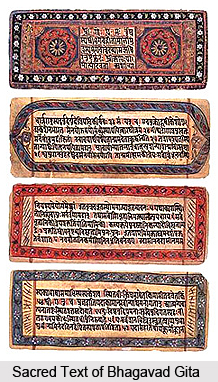 Indian philosophy has always been blessed enough to be infused with literary luminaries since pre-recorded times, which are known to have been passed on orally. The mode of writing or scripting down was yet not in vogue, as the guru-shishya parampara (the teacher-student tradition) just prevailed by word of mouth. With Hinduism and Hindus then occupying a dominant position, religious philosophy of Hindus started to take up the broad picture with concepts based in God, atheism, logic, mind and matter and meditation. With passage of time, however reputation and admiration of these thinkers and philosophers started to spread far and wide, not being just restricted to the common locality. The uncharted territories, the hinterlands, as such, began to be exposed to philosophical beliefs and criticisms. This move brought the ancient Indian population much closer in theory and even practicality. Hinduism and Hindu philosophy had paved way for other religious movements to spring forth with their own views and arguments. The further rise of Buddhism, Jainism, even a separate faction under Hinduism, the Carvakas began to evolve in the pre-Christian and post-Christian eras. The mind-boggling theories and spiritualities amassed had indeed frozen the time difference within these two eras. In this exceedingly unique context comes the much appreciated interference of Indian philosophical texts.
Indian philosophy has always been blessed enough to be infused with literary luminaries since pre-recorded times, which are known to have been passed on orally. The mode of writing or scripting down was yet not in vogue, as the guru-shishya parampara (the teacher-student tradition) just prevailed by word of mouth. With Hinduism and Hindus then occupying a dominant position, religious philosophy of Hindus started to take up the broad picture with concepts based in God, atheism, logic, mind and matter and meditation. With passage of time, however reputation and admiration of these thinkers and philosophers started to spread far and wide, not being just restricted to the common locality. The uncharted territories, the hinterlands, as such, began to be exposed to philosophical beliefs and criticisms. This move brought the ancient Indian population much closer in theory and even practicality. Hinduism and Hindu philosophy had paved way for other religious movements to spring forth with their own views and arguments. The further rise of Buddhism, Jainism, even a separate faction under Hinduism, the Carvakas began to evolve in the pre-Christian and post-Christian eras. The mind-boggling theories and spiritualities amassed had indeed frozen the time difference within these two eras. In this exceedingly unique context comes the much appreciated interference of Indian philosophical texts.
Indian philosophical texts were a much later existence, when Indian philosophy was already popularised in India and distant lands. Geniuses had already come to light, with a mass list of followers being noticed too. Owing to such tremendous respect and esteem, thinkers and philosophers could no longer carry out the long-established oral tradition of transmitting knowledge and awareness. This ushered in the writing mode, paving way for the prolonged and legendary count of philosophical texts, still considered cardinal to many Indian religions. The separation and division amongst the emerging philosophical schools also had begun to materialise. Be it in the panoptic Hindu point of view with their various divisions of schools, or the assimilated Buddhist or Jain schools, the historical journey of Indian philosophical texts had commenced.
With splendid authors like Adi Shankara or Madhavacharya, or the rather recent ones like Chanakya, or even much later individuals like Raja Ram Mohan Roy or Swami Vivekananda, Indian philosophical texts have since time immemorial enriched citizens with more and even more knowledge and eruditeness. Sacred texts like Bhagavad Gita, Manu Smriti, Nyaya Sutra, Vaisheshika Sutra, Arthashastra, Pali Canon or Upanishads have unrelentingly rendered awareness on philosophy of ancient India steeped in usefulness and worthiness. Coifed with care and preserved with veneration, Indian philosophical texts have not faded into oblivion with the rise of 21st century.



















